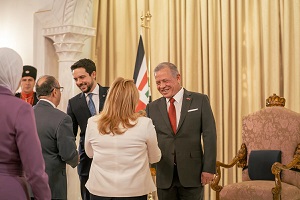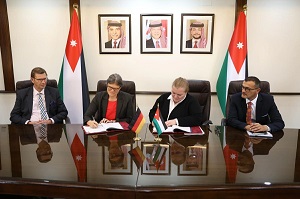From purpose to projects: The NGO reckoning - By Nermeen Murad, The Jordan Times
A big debate is brewing globally over the role, mandate and impact of civil society today. Civil society and NGOs were celebrated in the late 90s and early 2000s - at the end of the cold war or what is referred to as the “liberal era” - for their contribution to democracy, accountability and transparency. Several recent articles in Foreign Affairs and The New Humanitarian have reflected on the changing role of NGOs. They noted that there was a significant “power shift”, at that time, and NGOs globally were proliferating and seizing authority and influence from states.
That is when I entered the field of international development.
It was a time of expansion and optimism in Jordan specifically. It was post-peace treaty era, there were several reform initiatives on the horizon, and an influx of donor programmes. Notable clusters of idealist well-educated individuals rallied around what they saw as national priorities, and the expanding sector became a magnet for young women and men providing them with a new brand of employment that also introduced global practices, governance and operational systems.
The world was our horizon: donors were equally invested and ready to support both financially and intellectually, and the government, on its own trajectory of democratisation, appreciated that these “organised efforts” were locally motived and issue-based, and only slightly politically motivated (i.e. not fully informed by regional Arab politics), and appeared to augment the government’s development plans. This emerging sector paved a new road to the budding globalisation, carried a local moral weight and a introduced a new type of professional and prestigious experience.
I can’t really put my finger on exactly when things began to turn but it was in the latter part of the 2010s and tipping into the 2020s. Some might argue that the idealists became more pragmatic. The optimism of the post peace era eroded, and the government became less enamoured of its new civil society “partners” as they competed on funding, pontificated on all issues, and enjoyed equal access to donors influencing their agenda and funding tracks for the country.
Some would say there was the beginnings of donor fatigue, and there might have been. But I also believe that most donors began to exercise the “political” potential that came with their financial investment, and NGOs, now almost wholly dependent on donors, slowly shed their “democracy and social equity promotion” robes to meet donor requirements and financial gain. I believe this is when the line blurred between civil society as morally and ethically driven “watchdog” and as a contracted service provider.
Next, the early to mid 2020s, came what some would describe as a “recalibration” of priorities, methodologies and global political drivers and frameworks of both the NGO and donor spaces. I think that this is a true description, although “recalibration” may imply a softer landing than what we witnessed and suggests an innocence in motive that is not necessarily completely accurate.
The” recalibration” we are witnessing is almost a complete structural turnaround away from NGO “intermediaries” towards direct public and private sector engagement on more “economic” priorities. Foreign Affairs (2025) described this shift as “the end of the age of NGOs,” noting their swing away from what they called “moral authority” to market logic. NGOs, hit almost overnight with decisions to shut down funding, a la USAID, or reduce it, as per many European donors, have either closed or are struggling to survive.
The OECD Development Report (2024) said it as it is: donors are “increasingly working through governments and private-sector partnerships.” We don’t have accurate or up to date figures that can quantify the diversion of funds, but Global Humanitarian Assistance (2023) estimated that only “about 1-2 percent of aid” goes directly to local actors. Simultaneously, the state and private sector have adopted “development language” of CSR, innovation hubs, and inclusion initiatives effectively crowding the space once held by NGOs.
There is no doubt that things have changed drastically from those dreamy days in the 90s. There is no doubt that these are times when survival is only for the fittest, and the fitness criteria are now clout and money. I believe we are now at a critical and strategic crossing point at which governments and donors need to decide: Do we really want to institutionalise the removal of the development sector’s “moral compass” by crowding out NGOs and usurping them of their original mandate? Does a shrinking civil space serve the public good?
The NGO community, like governments and donors, must also pause to ask itself what still defines the public good and how faithfully have we served it. If we have become too comfortable in our own ecosystems of funding, language and routine, then we may find ourselves, as many would argue has already happened, landed in a diminished role and relevance.
Every era redefines what it calls the public good. Governments legislate it, donors fund it, companies brand it, but civil society is meant to live and deliver it. If that purpose has blurred, then the task before us is to consider whose interests we serve, whose voices we amplify, and whose trust we must rebuild.
In Jordan, as elsewhere, it is easy to point to governments that over-regulate, donors that dictate priorities, or private-sector actors that commercialise social value. But civil society, too, must look inward. All actors - donors included - have sometimes multiplied initiatives and mandates without coordination, wasting effort and thinning impact. The renewal of the NGO spirit will come not from nostalgia for the 1990s, but from a deliberate effort to serve with purpose, beyond projects and contracts. And perhaps all that begins with remembering why we cared in the first place.




